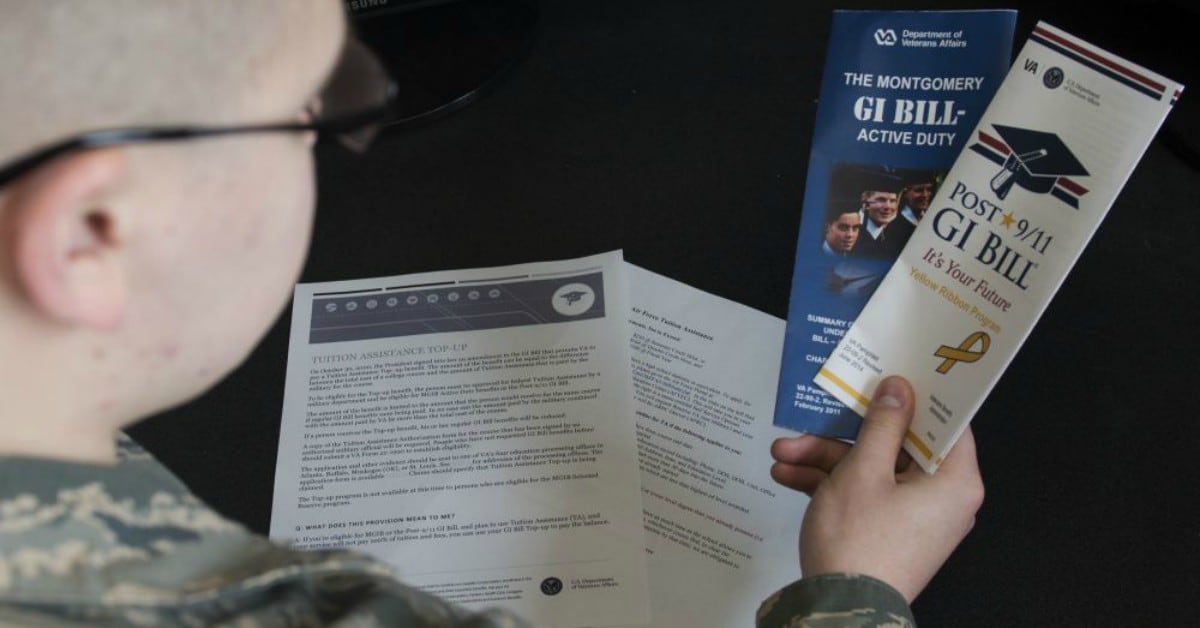A recent federal court decision could dramatically expand veterans education benefits by allowing them an extra year of tuition assistance if they qualify for both the Post-9/11 GI Bill program and the older Montgomery GI Bill payouts.
Veterans Affairs officials have not yet decided if they will appeal the ruling, which if put in effect would impact tens of thousands of veterans and run a price tag into hundreds of millions of dollars. Education groups are watching the legal fight closely.
The decision, from the U.S. Court of Appeals for Veterans Claims earlier this month, found the Department of Veterans Affairs practice of making veterans relinquish their Montgomery GI Bill eligibility in order to receive Post-9/11 GI Bill payouts is improper. Department officials in the past have argued that move is necessary to ensure veterans aren’t duplicating benefits.
RELATED

But in a 2-1 decision, the judicial panel ruled that federal language prohibiting such “double-dipping” more appropriately means that “someone may not receive assistance from more than one program during a single month, semester, or other applicable pay period, but may switch freely between programs.”
As a result, if veterans are eligible for both programs, they should receive payouts from both, just not simultaneously, the decision said.
Under current rules, the Post-9/11 GI Bill provides 36 months of tuition assistance and living stipends veterans (or their family members) who served at least three years on active-duty after Sept. 10, 2001. The Montgomery GI Bill provides a smaller, standardized stipend for 36 months to veterans who served on active duty for at least three years and paid into the program upon enlistment.
In all but a few cases, veterans receive one benefit or the other, but not both.
The Montgomery GI Bill benefit has become controversial in recent years because many servicemembers still contribute to the program even though they’re unlikely to see any benefit from it. Since the Post-9/11 GI Bill is more generous in its payouts, most veterans relinquish their Montgomery program benefits when it comes time to attend classes. Lawmakers have discussed ending the program in coming years.
In this lawsuit, an unnamed veteran with eight years of interrupted active-duty service from 2000 to 2011. During his breaks from the military, he used up about 26 months of his Montgomery GI Bill benefits.
In 2015, he attempted to switch over to the more generous Post-911 GI Bill benefits but was told he would only be eligible for 10 more months of education assistance.
But his lawyers argued that since it was a separate program with a separate qualifying period of service, he should get both. Under other federal statute, the combined education benefits would be capped at 48 months, giving him potentially 22 more months of payouts.
RELATED

The difference would have been enough to cover a full degree at Yale, where he had been accepted. But because the VA limited his payouts to 10 months, he was ultimately forced to abandon that degree program.
Hunton Andrews Kurth Associate Tim McHugh, an Army veteran who led the legal fight against the VA, said the court’s decision also left open the issue the length of a qualifying period of service for eligibility.
While his client had clear breaks between service, he argues the ruling could also cover any individual who served six years — three years to qualify for full Post-9/11 benefits, and three more to qualify for Montgomery GI Bill payouts.
“As long as they have enough time to qualify, if they have the service they should get the benefits,” he said. “And they should be free to use it.”
In a dissenting opinion, Judge Margaret Bartley argued her fellow justices “demonstrate a misunderstanding” of how the education benefits work and of congressional intent with establishing both programs.
“There is no indication, based on the text of the relevant statutes, that Congress intended this outcome or that it is more veteran-friendly,” she wrote.
VA officials will have to make a decision on appeal in coming weeks. If the decision is allowed to stand by other courts, it would likely force the department to quickly institute a host of rule changes for current and former beneficiaries, a process that could severely complicate delivery of education benefits in the years ahead.
Leo covers Congress, Veterans Affairs and the White House for Military Times. He has covered Washington, D.C. since 2004, focusing on military personnel and veterans policies. His work has earned numerous honors, including a 2009 Polk award, a 2010 National Headliner Award, the IAVA Leadership in Journalism award and the VFW News Media award.




